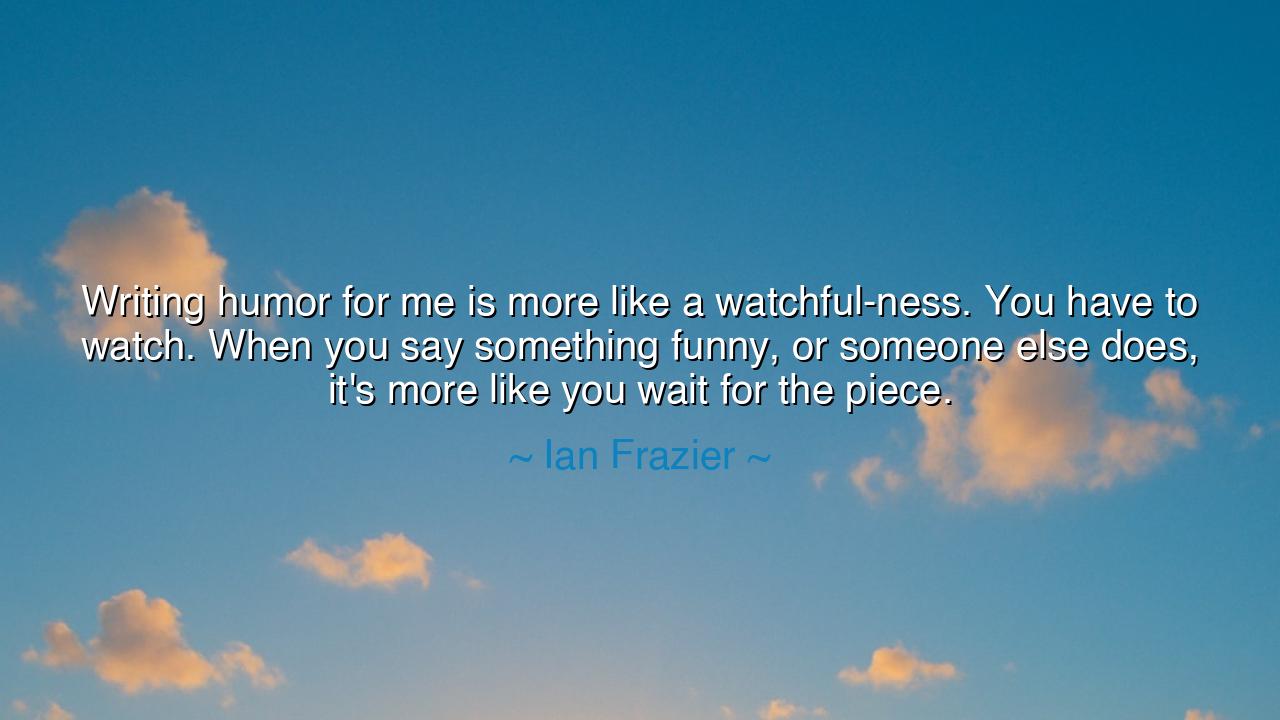
Writing humor for me is more like a watchful-ness. You have to
Writing humor for me is more like a watchful-ness. You have to watch. When you say something funny, or someone else does, it's more like you wait for the piece.






In the art of humor, there lies a sacred truth, a subtle understanding that great wit does not arise from force, but from observation. Ian Frazier, with the clarity of a sage, once said, "Writing humor for me is more like a watchfulness. You have to watch. When you say something funny, or someone else does, it's more like you wait for the piece." These words speak to the very essence of humor: it is not something to be created by force or will, but something that is discovered, like a hidden treasure revealed to those who are patient enough to see it. It is a watchfulness—a deep, alert awareness of the world around us, a constant openness to the unexpected moments that carry the seeds of wit.
In the great teachings of the ancients, there was an understanding that the most profound insights often come not from striving, but from stilling the mind and observing what lies before us. Socrates, the philosopher of Athens, did not force understanding onto others, but instead, through his method of questioning, guided his disciples to their own realizations. His wisdom was born of watching, of understanding the world not through assumptions, but through careful, deliberate observation. Humor, in the ancient sense, was no different. It was not about imposing a joke upon the world; it was about seeing the world in its absurdity and truth, and allowing that to bring forth laughter.
Consider the wisdom of Aristotle, who saw the world not in grand theories alone, but in the details—the actions, the gestures, the words. To him, the true understanding of the human soul was found not in lofty speeches, but in the small moments that spoke volumes. Humor, as the ancients knew, is not an invention, but a recognition. A moment of laughter is not forced; it is a sudden realization of something inherent in the fabric of life itself. It is not an aggressive pursuit, but a careful watching, a waiting for the piece to unfold before us. Frazier echoes this ancient wisdom when he speaks of waiting for the piece—the humor comes not from striving to make others laugh, but from waiting for that perfect moment when the absurdity or beauty of the world presents itself, clear and unmistakable.
In the lives of the great playwrights and storytellers, this principle of watchfulness was paramount. Consider the example of Shakespeare, whose wit was not born from a desire to entertain, but from his keen observation of the world and the people in it. His characters—be they kings or jesters—were reflections of the human experience in all its grandeur and folly. Shakespeare did not try to force humor; instead, he watched the world, listened to the voices around him, and in those observations, he found his humor. Frazier, too, follows this path—a path of patient observation, of waiting for the humor to reveal itself, rather than forcing it into existence. The great writer watches, listens, and through this stillness, the humor becomes clear.
The lesson for us is profound and clear: humor is not something to be forced, but something to be watched for. In our lives, too often we rush through our days, eager to make a point, to speak, to fill the silence with noise. Yet, the wisdom of Frazier and the ancients teaches us that the most profound moments come when we stop, when we observe and listen. Humor arises not when we seek to impress, but when we allow the world to speak for itself. We must learn to wait, to be present, to see the irony, the absurdity, and the truth that lie in every corner of life.
As we walk through life, let us practice this art of watchfulness. Let us not rush to speak, to make a joke, or to fill the silence with our own words. Instead, let us wait for the humor to reveal itself, as it inevitably will. In the small moments—the quiet gestures, the innocent mistakes, the unexpected truths—we will find the laughter that comes from true understanding. The world is full of humor, but it is for those who wait, for those who observe, to see it.
Therefore, let us embrace the wisdom of Frazier and the ancients. Let us become watchful, not rushing to impose our own ideas, but patiently awaiting the pieces of humor that will reveal themselves to us. And in that watchfulness, we will find not only laughter but the deepest insights into the world and our place within it. Through this quiet awareness, we discover that humor is not a force, but a gift—one that is waiting for us, always ready to reveal its truths when we are ready to receive it.






AAdministratorAdministrator
Welcome, honored guests. Please leave a comment, we will respond soon